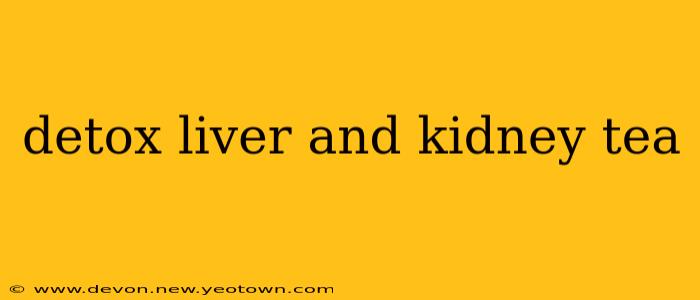For centuries, herbal teas have been revered for their potential health benefits, and the idea of a "detox" tea for the liver and kidneys is particularly appealing in today's world of processed foods and environmental toxins. But what's the truth behind these claims? Can a simple cup of tea truly cleanse these vital organs? Let's explore the fascinating world of liver and kidney support through herbal infusions.
This isn't about a magical overnight cure; rather, it's about supporting the incredible natural detoxification processes your liver and kidneys already perform daily. Think of these teas as gentle allies in your overall wellness journey.
What are the Benefits of Detox Teas for the Liver and Kidneys?
The purported benefits of detox teas for the liver and kidneys stem from the properties of the herbs they contain. Many herbs boast antioxidant, anti-inflammatory, and diuretic properties, all of which can indirectly support liver and kidney function. It’s crucial to remember that these teas aren't a replacement for medical treatment, but rather a complementary approach.
Many herbal teas associated with liver and kidney support contain ingredients known for their potential to:
- Support healthy liver function: Some herbs may help protect liver cells from damage, boost detoxification processes, and promote overall liver health.
- Promote healthy kidney function: Certain herbs may help flush out excess fluids and waste products from the kidneys, thus potentially supporting their filtering capabilities.
- Reduce inflammation: Inflammation can impact both liver and kidney health. Many herbs possess anti-inflammatory properties, contributing to overall well-being.
- Boost antioxidant defenses: Antioxidants combat free radicals, potentially mitigating oxidative stress on the liver and kidneys.
What Herbs are Commonly Found in Liver and Kidney Detox Teas?
Several herbs frequently appear in blends marketed for liver and kidney support. These include, but aren't limited to:
- Milk Thistle: Renowned for its potential liver-protective effects, often attributed to its silymarin content.
- Dandelion Root: Known for its diuretic properties, which can assist the kidneys in removing excess fluids and waste.
- Burdock Root: Traditionally used to support detoxification pathways.
- Yellow Dock: Another herb with a history of use in traditional medicine for its potential cleansing properties.
- Ginger: A powerful anti-inflammatory and antioxidant often included in liver and kidney support blends.
Does Liver and Kidney Detox Tea Really Work?
This is a complex question. While there's anecdotal evidence and some research supporting the individual benefits of herbs commonly found in these teas, more rigorous scientific studies are needed to definitively prove their effectiveness in a “detox” sense. It's more accurate to say these teas may support liver and kidney function, not necessarily cleanse them in a drastic, immediate way. Your liver and kidneys are already amazing, efficient organs that continuously perform detoxification. These teas may provide gentle assistance.
Can I make Detox Tea at Home?
Absolutely! Many people choose to make their detox teas at home using readily available herbs. However, ensure you source high-quality, organically grown herbs to minimize pesticide exposure. Always start with a small amount to assess your individual tolerance, as some herbs can have interactions with medications or pre-existing health conditions.
What are the Potential Side Effects of Liver and Kidney Detox Tea?
As with any herbal remedy, potential side effects exist. These can vary depending on the specific herbs used and individual sensitivities. Some possible side effects include allergic reactions, digestive upset, and interactions with medications. It's crucial to consult with a healthcare professional before incorporating any new herbal remedy, especially if you have pre-existing medical conditions or are taking medications.
Are There Any Precautions I Should Take?
- Consult your doctor: Before using any liver or kidney detox tea, especially if you have underlying health issues or are taking medication.
- Start slowly: Begin with a small amount of tea to assess your tolerance.
- Choose reputable brands: Select teas from reputable brands that adhere to quality control standards.
- Be aware of potential interactions: Some herbs can interact with medications.
- Don't rely solely on tea: Detox teas should be considered a complementary approach, not a replacement for a healthy lifestyle and medical treatment.
This information is for educational purposes only and is not a substitute for professional medical advice. Always consult with a healthcare provider before starting any new herbal remedy or making changes to your healthcare plan. Remember, a healthy lifestyle, including a balanced diet, regular exercise, and adequate hydration, is crucial for optimal liver and kidney function.

